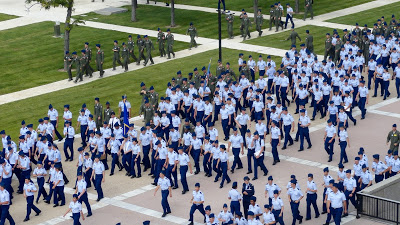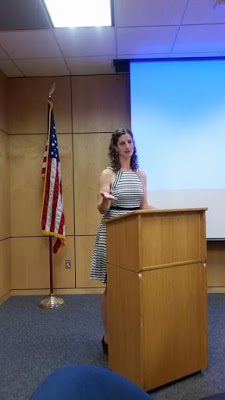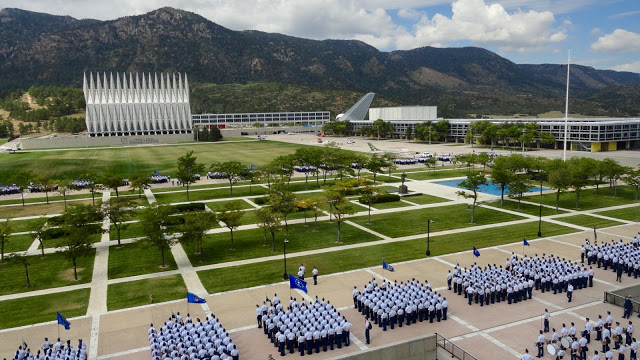Flashes of War at the US Air Force Academy (part 2)
Continuing the conversation from earlier this week, I want to share some of my encounters with the cadets during my visit to the United States Air Force Academy. This blog is somewhat like a public sketchpad for my writing life. When I’m really trying to understand a new idea, I may go on a little long. Next week, we’ll be back to regularly scheduled programming. Promise.
This trip has been full of “firsts” for me, not the least of which was my first time critiquing a teaching writer’s work in front of his own students. My gracious main point of contact at the Academy shared three of his flash fiction drafts and asked me to select one for critique. He then shared the marked-up draft with his students and when we gathered for class, his story was the topic at hand. I have no doubt the cadets respected their professor’s vulnerability in this regard, as did I.
When we reached an opportunity to talk about Flashes of War, the cadets in this non-majors class wanted to know about “the most common mistakes” early flash fiction writers make. (I told them new flashers take on a topic or timeframe that’s too big, or that they fail to realize what’s “at stake” for their characters and to show that on the page by way of reaction.). They wanted to know how I conducted the research that lead to Flashes of War. They wanted to know “how long it takes” me to write 3 pages. (Thirty-six years, a.k.a. the number of years I’ve been on the planet!) And they wanted to know which of my own stories was my “favorite.” To this last point, I told them (half-heartedly) that they should all just buy my book and then give it away as a gift when they were done reading it. (Note: Having your stories included in a college course doesn’t mean everyone buys your book; it means a lot of people are making photocopies…”Fair Use” constitutes 10% of a book, and many of my stories are online, so there are plenty of freebies out there, though most writers I know wouldn’t mind 40 more book sales that could have happened. In my world, the honest-to-goodness honor of being included as required reading in a college course makes up for it, for me…for now.)
This notion of a “favorite” story intrigued me, and rather than tell them what single story of my own to read, I sent them to Steve Almond’s “Geek Player, Love Slayer” from My Life in Heavy Metal, which was one of the first short stories I read that really affirmed my belief that anyone could write about anything. If Steve Almond could teach me something about being a woman in my thirties because he wrote so damn convincingly, then surely I could write about war. Our “favorite” stories, then, are those that teach us something unforgettable–and in the case of many writers, those that give us permission to push our own boundaries on the page.
The other two classes I met with were for upperclassmen and mostly (all?) English majors. The first class began with the faculty member saying, “None of you better ask Ms. Schultz what authority she has to write about war,” followed by a very succinct explanation of why, before he opened the floor to questions. This was completely unprompted by me and I admired the professor’s directness. He wanted to hit the ground running with meaningful conversation. By getting “authorization” summarized at the outset, we were able to do just that.
Immediately, these cadets were ready to go deep into the work. They wanted to know how I choose one word over another in a sentence (this meant I got to talk about verbs, which is basically my favorite thing to talk about other than Gus the Superdog). Another wanted to know about my background in philosophy and how that informs my love for language (this meant I got to talk about the web of words, Socrates, wonder, and the imagination). Another said that she normally “freaks out” when non-veterans write about the war experience, but that she didn’t have that response to my work. “They were different; these stories. There was something different about. What was that?” she asked. This opened the door to a conversation about the role of intent in the imagination. If the intent is to indoctrinate, appropriate, or destroy, then that’s going to show up in the work–and all of the cadets, I said, surely know when someone is trying to feed them a line of crap or persuade them of something for ulterior motives. I didn’t approach Flashes of War with the feeling that I might actually know “what’s right” and “what’s wrong.” I’m glad this young woman was able to see and feel that. There’s nothing (other then a contract for my next book!), that I think I want more as a writer, in fact.
Finally, I found an entry point into the topic of growing concern in my own mind: Is the imagination valued at the United States Air Force Academy? I’ve spent a lot of time thinking about research and the imagination, but it was only this week that I felt prompted to ponder discipline and the imagination. The warm-up to this topic, I’m certain, occurred during my phone conversation with Academy alumnus, veteran, teacher, writer, and go-getter Jay Moad, who I spoke to before my flight. Jay helped me realize that in order to get through to the cadets, I’d need to speak to issues on their trajectory, namely, the fact that they are being trained as future leaders. (There are less kind words besides “leader” for a cadet…such as “premeditated murderer” or “reluctant killer”–two labels I heard off and on during my visit, which startled me.) Jay rightly explained to me that if a cadet wants to be a good leader, he/she needs to be able to relate to and understand those men and women serving around them. How do we relate to people, especially those from different walks of life? By using our imaginations, of course, and I’d add to that, by using empathy.
Furthering that thought, why not meet these people different than ourselves by studying them first in fiction? Why not explore the greats and the contemporaries, then ponder how they did what they did and got it right, and what can be gained from these endeavors? We may not be able to “teach imagination” like we can teach chemistry, but we can nurture its possibility by creating the causes and conditions from which the imagination is born. Tomorrow’s leaders should study the “how” of literature not just because “it’s something to major in,” but because it is, in fact, a life-saving skill.
I also told the cadets that if they could understand the men and women they were trying to lead, those people would “work that much harder for them” (Jay’s words). Then I told them about my experience on the 6th floor of the library, in a place where apparently no one goes, which also happens to be the only place on campus where I saw obsession and the imagination at their best. “I’ve only been here a few days,” I said, “and I have the feeling you all have discipline down pat.” They nodded. A few smiled.
“If you can do formation,” one woman said, “then that means you know how to pay attention to details. Details matter.”
I told her I couldn’t agree more. “But discipline by itself only makes you get really good at doing what’s already been done,” I said. “Or doing the same thing over and over again. Discipline alone is limiting, and discipline without the imagination is, in fact, a failure.”
The cadets didn’t balk. They were right there with me, and I’m certain that the open environment this professor has created in his classroom was a big part of that. When I asked them whether or not their training encouraged them to imagine, whether they were learning how to nurture and regard the imagination, and whether they felt that the imagination was valued as a tactical military skill, I was met with a universal shaking of heads. No. No, no, and NO.
“We’re taught to ‘know our people,'” one young woman said. “But we’re taught that that means knowing their names, where they’re from, if they have siblings, what their hobbies are, etc. But I guess….” here she paused. “…I guess that’s not really ‘knowing’ someone.”
Quite suddenly, we were out of time and class ended. I felt a sense of immediacy; I wanted to grab the bright minds in that room and form a cadet committee devoted to curriculum overhaul, in short–to the possibility of actually teaching someone that real changes begin with unadulterated inquiry and wonder. From there, we apply the imagination and our intelligence to make change happen. Add discipline into the mix and, quite truly, you have the power to change the world for the better. But if we don’t know how to smell a rat (a.k.a. an agenda), then we’ll never really be able to get to a place of true openness and understanding. And if we found an institution with the agenda that we have a universal right to defend our lives and “our soil” to the death (and sometimes, pre-emptively), can we even gain access to unadulterated inquiry? Can we imagine outside of ourselves just as effectively as we can fly a fighter jet? Can we ever, really, actually, “win”?
I think of Kunduz, Afghanistan, in particular. I think of ISIS. I think if Iraq, Iraq, Iraq. We’ve built our wall of military might and ambition so high, all we can do is beat our heads against it over and over. How can we possibly see over that wall? How can we venture around it? By imagining, of course, and although I’m writing metaphorically, I hope my intent is clear: We’ll die and die again, taking thousands along with us, if today’s military leaders and the cadet-leaders of the future don’t start thinking like fiction writers, too.
This line of thought is not without flaws, I realize. My view is not all-encompassing. One might, for example, argue that the display I saw of every military-issued [gun? rifle?] since the civil war is, in fact, humankind’s imagination at its very best. A meeting of technology and endeavor. Perhaps…but I keep going back to intent…I keep going back to agenda…and while I do believe there can be a “just war,” I’m not sure I’ve seen one executed that way, start to finish.
Fast forward a few hours and a few more classes, and I’m on the 6th floor of Fairchild academic building, looking over the terrazzo. [Rank X] is with me, my host for lunch. He’s spent 12 hour shifts in bunkers for months on end, working missile defense drills and waiting at the ready, in the event of a land or air attack over U.S. soil. His smile today, outside the confines of that bunker, is wide and welcoming. Later, I’ll meet equally wide smiling officers–some who have moved American cash across deserts and borders, one who transported a captive with a bag over his head, another who agonizes over an upcoming PT test and waistline measurement, another buying diamonds for his wife, another working on an essay for academic publication, and still another who can’t say a damn thing about what he did or where. But here, now, with [Rank X], the cadets are lining up for formation on the terrazzo just before lunch. (See the ones jogging in this video? Those are the freshman. They can only jog [never walk] on the outside line of the pavement, they can only carry their backpacks in their left hands [never wear them], can only use certain staircases [not the convenient ones], and cannot speak outdoors unless spoken to, among other notable orders that will change as they progress through their education at the academy).
And here’s the view mere moments later, before the cadets march into Mitchell dining facility, a large kitchen which feeds 4,000 growing bodies in under 20 minutes.
I wanted to stop time, overlooking this “garden of gods” filled with “reluctant killers” or “future leaders.” I wanted to pull the tape from the reel and watch it fall onto the floor. I wanted to stomp my feet, to shout, to pound the glass with my fists. More than anything, I wanted the sun to stay warm and steady in the sky for a little longer while all those cadets fell out of formation, lounged in the grass, and settled in with a few good books and the permission to imagine beyond. Beyond. And beyond again. Can’t you see it? Their blue caps in the grass, their shiny shoes reflecting that crystal Colorado sunlight, the pages turning, turning, and all the smiles of youth lit across their faces like so many lives being saved.




